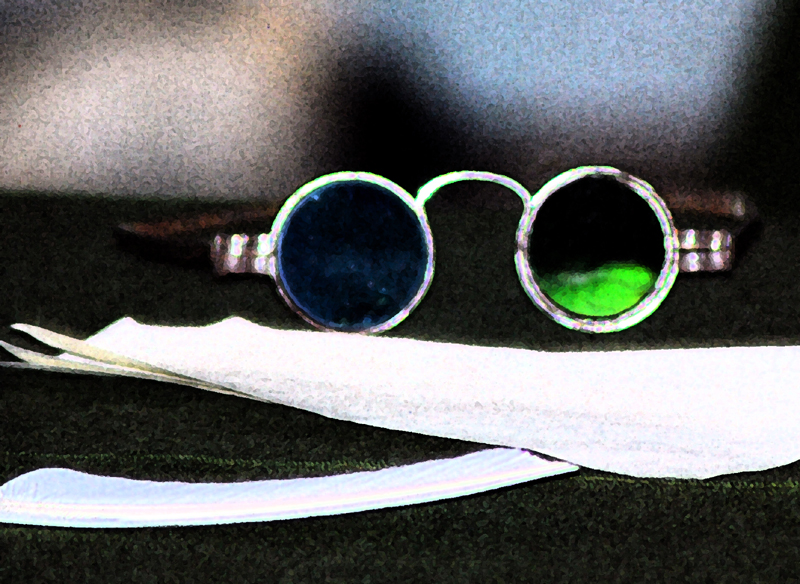Looking for Part 1? Click here to read the beginning of Cassandra Rose Clarke’s novella Farrago.
“It’s a woman.”
Henry slumped at his desk, ran his hand over the scattered paperwork. Felton stood beside him.
“A woman is just as capable of manipulating genetic makeup as a man.”
“Not really a matter of intellectual capacity.” Henry rubbed his forehead. “I just can’t picture a woman doing it, is all. That kind of meanness.”
“This does help us,” Felton said. “Certainly narrows the field.” He paused. “You did well in there. I know how squeamish you are about the up–”
“There isn’t a single lady scientist on file,” Henry said.
Felton paused. Henry didn’t look at him. “I’m aware of that,” Felton finally said. “But she can’t hide behind her sex any longer.”
Henry leaned back in his chair, listened to it creak beneath his weight. He rubbed at his jaw, the stubble scratching his palm.
“She’s gonna clear out the house,” Henry said. “Have we got a warrant on it yet?”
“Still waiting. Should have it soon, though.”
“Shit. Figures.”
“We’ve got men down there, still watching the place. Haven’t seen anything.”
Henry sighed. Felton stood too close to him. He thought he felt the air buzzing, some faint output from Felton’s systems. Or maybe it was his own network of wires and circuits. He looked down at his arm. A lopsided rectangle of a scar, pink and faint. It’d be gone by morning.
“I think Cecilia’s into you,” Henry said. Felton dimmed his eyes but otherwise said nothing. Figures. “You should ask her out for coffee.”
Before Felton could reply — assuming he had any intention of it, who the hell knew with robots — Henry grabbed his coat and headed into the cold gray mist outside. Felton didn’t follow him. No one did.
Henry walked three blocks down to the bar on the corner, a shabby little hole-in-the-wall that changed names every couple of months but kept the windows tinted so people driving by on their way home from work couldn’t glance over and see their neighbors. When he stepped in the smell hit him like a punch, sour beer and stale cigarette smoke and the musty damp of winter. At least no one looked up from their drinks. It was that kind of place.
The bartender smiled a little when he approached, like she recognized him from those first few weeks after Melanie left, when he came in here every night, before he took up bowling again.
“What can I do you for?” she said, even as she reached for the stack of whiskey tumblers. Whiskey on the rocks. Terrible for human and machine both: the circuits webbing out inside him, the liver nesting shriveled and worn against his ribcage.
The bartender handed Henry his drink, then returned to wiping the counter with a damp dishrag. Henry sat down at a booth in the corner. The ice clinked against the glass. He leaned his head against the booth’s cracked red plastic. Studied the patterns etched into the lamp hanging overhead.
When he closed his eyes, he saw Melanie, he saw Cecilia.
Melanie left because of the upgrades. It wasn’t a secret: she told him, flat out, as she packed her clothes in that round blue plastic suitcase he bought her for their fifth anniversary. Bruises ringed her wrist like a bracelet. He hadn’t been angry when he grabbed her, just excited, brimming up with love and lust and the upgrades hadn’t understood either. And he wasn’t used to his strength yet.
“I can’t deal with this,” Melanie said. She never cried, not once, not in the entire time that their marriage dissolved. Every time she spoke her voice rang flat and tinny. That hurt him most of all. “I don’t want to worry you’re going to kill me every time you touch me.” She didn’t look at him. Her hair swung across her face as her hands plucked up another blouse, another skirt, another pair of stockings, rolling them up tight and tucking them into the suitcase.
And Henry hadn’t done anything but watch, because the upgrades were pulling apart his insides, wanting him to fight. He trembled in the corner, sweat beading out of his pores. He dug his nails into his palm until he drew blood, and when that wasn’t enough he tore his skin to shreds. And then he had watched her walk away.
Henry drained the glass of whiskey, held the glass up over his head until the bartender nodded and poured him another. The rain had picked up — drops pinged against the roof, knocked against the darkened windows. Sounded like the whole world was falling apart. Melanie leaving, that he could understand. She married a man and he went and made himself half-machine. But figures the one girl he met since then, the one girl he thought about at night, listening to the heater rattle and huff in its corner as he fought back wave after wave of loneliness — figures she’d be a robbie-lover. One wanted a man, the other a machine. When you fall in between you get nothing.
And a lady mad scientist? Henry sipped at the whiskey, let it soften his brain. Before the upgrades, he couldn’t even have begun to imagine something that wild. Not anymore.

